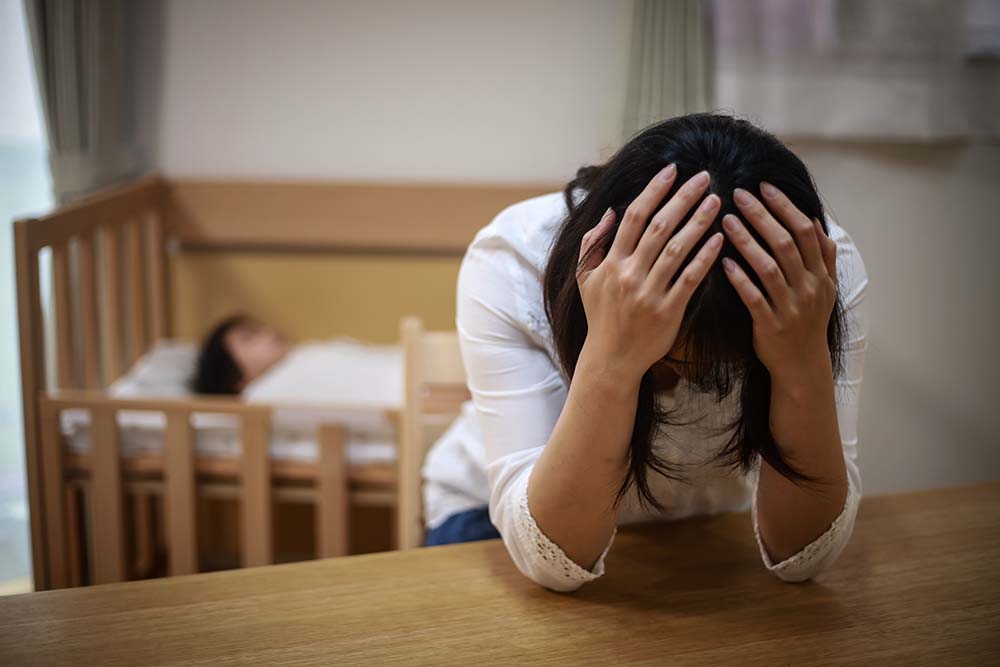Last year, former Chief Minister BS Yediyurappa’s granddaughter, Dr Soundarya Neeraj, took her own life after a long and lengthy battle with postpartum depression. Young, talented, and successful, Soundarya was married to a fellow doctor and had a nine-month-old baby boy. The incident brought to light the fact that postpartum depression is a real and serious problem; awareness and discussions surrounding the topic are essential for new mothers and those around them.
“As the name suggests, postpartum depression, or PPD or postnatal depression, occurs soon after a woman gives birth to a child. It is a mood disorder with feelings of sadness, anxiety, hopelessness, and despair,” says Hyderabad-based psychologist, Ketaki Jain. “After you deliver your baby, your hormones suddenly plummet. The extra progesterone, oestrogen, and thyroid hormones in your body drop, and the impact causes postpartum depression in some women. Anyone can get postpartum depression, but in India, there are also certain external triggers. Worrying about finances can compound the issue, as can marital difficulties and domestic violence. Lack of help and support (especially among first-time mothers), a feeling of loneliness, and, in some cases, even the stigma of giving birth to a girl child can accelerate these feelings of postpartum depression.
“Some common symptoms include insomnia, mood changes, loss of appetite, fatigue, and low self-esteem. If left unchecked, it can lead to a far more serious disorder called postpartum psychosis. When this develops, the new mother develops thoughts of harming the child and/or herself. It is characterised by hallucinations, delusionary behaviour, extreme mood swings, anger, and agitation. In this case, medical intervention and treatment by a mental health professional is necessary at the earliest. Most women do not even realise that they suffer from postpartum psychosis, so it is up to close friends and family to sense that they need help and take action on their behalf.”
Statistics released by the World Health Organization reveal that over 20 per cent of new mothers in India struggle with postpartum depression. This means at least one in five mothers has experienced it. The number is much higher than the global average of one in seven mothers. In some cases, women do not report postpartum depression at all, since it is taboo to speak about feeling depressed when you have just been gifted a child.
Several mothers experience what is known as ‘baby blues’ or postpartum blues, but these are mild and last only a couple of weeks. In fact, most mothers would have gone through this in some form or manner. But one needs to keep an eye out for the fine line between postpartum blues and postpartum depression since it takes little to crossover.

“I was one week into motherhood when I started feeling irritable and restless,” says entrepreneur Mansi Gandhi-Shroff. “I wasn’t motivated enough to do the things I normally enjoyed. Initially, I chalked this feeling down to tiredness and sleeplessness. A month went by and I realised things were far worse. I was crying all the time, felt like life wasn’t worth living and I wasn’t even interested in my baby. That’s when I knew I needed help. I spoke to my husband and we sought the services of a counsellor – the best decision I ever made. Today, I am part of a support group to help other new mothers cope with PPD. Based on my experiences, if you’re a new mother or going to become one shortly, here’s some advice.”
1. Awareness is half the battle won. If you read up and speak to your healthcare provider about postpartum depression, it is much easier to identify symptoms and figure out what kind of help you would subsequently need.
2. Start a support group with like-minded mothers who may have similar feelings. Misery loves company – and so do mothers who need to feel supported and understood through this rollercoaster of a journey.
3. Get help after your delivery. Don’t try to be supermom. Don’t do everything on your own and wear yourself down. In 20 years, your child isn’t going to remember that you turned down the bedsheets of the baby cot every night yourself. Make sure your partner chips in towards half of the parenting duties. Enlist friends, family staff – whoever and whatever resources are available – to ease your physical and mental burden. Instead of just feeling like you have to get the job done, find meaningful ways and spaces to bond with your baby.
4. Eat right, exercise and sleep well. This isn’t just to elevate your mood after you’ve given birth, but is the lifelong key to better mental health. Get omega 3 fatty acids into your diet, either through seafood or supplements.
5. If breastfeeding is getting you down, consider other ways to feed your child – pumping or mixing in a few formula feeding sessions. You don’t have to do what “all the other mothers are doing” if it makes you unhappy.
6. Limit visitors if they’re bothering you. Let it be known that you’re not yet ready to receive guests and deal with the added burden of being hospitable.
7. If you try all of this and still feel like it hasn’t helped, seek a professional’s diagnosis and treatment. Support and talk therapy helped me greatly, but in some cases, you may need antidepressants, at least in the initial phase of treatment.
If postpartum depression is left untreated, it could become chronic and even lead to mental health issues later in life. It may also impact your relationship with your spouse and your child. Find time to bond with your family during this trying period. If you know a mother dealing with postpartum depression, don’t dismiss it; it will only ensure that she moves one step further away from getting the help she deserves.